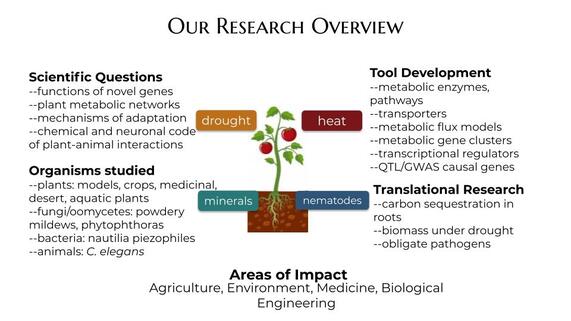Seung Yon (Sue) Rhee, Ph.D.
Seung Yon (Sue) Rhee is a Michigan State University Foundation Professor in the departments of Biochemistry and Molecular Biology, Plant Biology, and Plant, Soil, and Microbiology and Director of MSU’s Plant Resilience Institute. Dr. Rhee’s group strives to understand how plants adapt and acclimate to changes in temperature, water availability, or nutrient limitation. They are also interested in decoding biological traits from molecular to organism scales. In addition, they are developing translational research programs involving engineering resilience and metabolic traits in bioenergy and cover crops. Dr. Rhee has extensive leadership, mentoring, and research experience and has trained over 160 scientists, many of whom have achieved leadership positions in academia, government, and industry.
Dr. Rhee received her B.A. in biology from Swarthmore College in 1992 and a Ph.D. in biology from Stanford University in 1998. In 1999, she joined Carnegie Institution for Science as Staff Associate and became the Founding Director of the Arabidopsis Information Resource (TAIR, Arabidopsis.org). She rose through the ranks at Carnegie to Staff Scientist, Acting Director, and Senior Staff Scientist between 1999 to 2023, before joining MSU in 2023. Her group was instrumental in establishing the Gene Ontology system (http://geneontology.org/). She also initiated two grassroots, international scientific communities, one on Biocuration (https://www.biocuration.org/) to systematically annotate biological entities and second on Plant Cell Atlas (https://www.plantcellatlas.org/) to understand and engineer plant cells using single cell approaches. Most recently, she established a virtual institute called Water and Life Interface Institute (WALII, https://www.walii.science/) to understand how organisms survive with very little water. She has extensive leadership and community service experience with having served on over 25 scientific advisory boards, steering committees, and review boards.
Dr. Rhee is interested in training future leaders who come from historically excluded groups and who are interested in working on neglected research and societal problems. She emphasizes training scientists to explore the unknown and become independent in the pursuit of knowledge. While providing individualized training and mentoring program suited for each member, she strives to transition each trainee on creating and fostering agency to own their work and projects. Dr. Rhee is committed to creating a rigorous, collaborative, and innovative training environment. Expectations of lab members, which are elaborated on their lab website (https://www.rheelab.org/policies--expectations.html), are clearly communicated and discussed during recruitment, onboarding, and regularly throughout the tenure of each member. Dr. Rhee emphasizes responsible conduct of research, leadership, and communications in her training. Leadership based on service to fellow lab members, mentees, and the larger community in the department is highly valued, encouraged, recognized, and acknowledged. Every member of the Rhee lab plays active roles in improving the professional development and work environment for everyone in the lab and department. She meets with each lab member regularly (weekly or biweekly) and discuss not only their research design, implementation, data analysis, visualization, interpretation, and presentation, but also scholarly leadership, communication skills, teaching and mentoring skills, career planning, outreach and community leadership, and wellness and self-improvement. Her group performs individual development plans every six months and constantly evaluate how the training program is going via surveys, one-one meetings, and group discussions.
Rhee Lab Research
Climate change is the single biggest threat to global human health, and is expected to cause about a quarter of a million deaths globally from malnutrition, infectious diseases and heat stress (link). Climate change is rapidly changing the habitability of many species on many places on Earth. We need innovations in science and technology to tackle global sustainability, food security, human health, and biodiversity.
Plants not only underpin terrestrial ecosystems and feed us, but also bestow renewable energy and essential medicines. Plants also sequester a significant proportion of the world’s carbon. Therefore, to meet today’s societal challenges, we need technological and conceptual advances in plant science.

We aim to uncover the molecular mechanisms underlying adaptive traits in the face of heat, drought, nutrient limitation, latitude and pests. We study a variety of plants including models, orphan crops, medicinal and desert plants. More recently our work has involved studying a model nematode C. elegans, fungal pathogens, corals, and piezophilic bacterium. Our group employs computational modeling and targeted laboratory testing to study mechanisms of adaptation, functions of novel genes, organization and function of metabolic networks, and chemical and neuronal code of plant-animal interactions. We are also interested in developing translational research programs involving carbon sequestration by plants and biomass maximization under drought in bioenergy crops.
Publications and Links of Interest
-
- Dr. Rhee's Publications and Talks
- Dr. Rhee's Citations on Google Scholar
- Rhee Lab Website
- Plant Resilience Institute Website




 Print
Print Email
Email